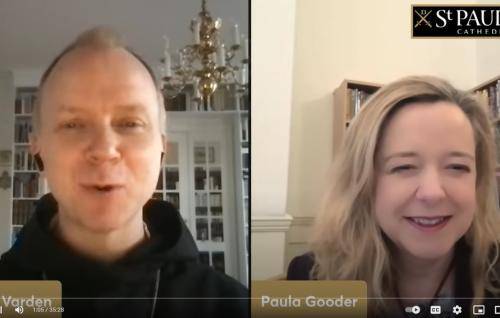Preparing for Easter: Self-Examination
Preparing for Easter: Self-Examination
Reflections by Adéọlá Eleyae for the season of Lent.
1. Discomfort and Joy
The tip of the rear garden of my home backs on to a petrol station. But for decades this was hardly noticeable as the tall, horseshoe shaped row of trees around it provided cover from the noise, the lights and the roar of rush hour traffic.
Then a few weeks ago as part of a major renovation project most of the trees around the petrol station were cut down, leaving my house and several of my neighbours’ houses utterly exposed.
The trees - a selection of Leyland Cypresses and Norway Maples - had been pruned recently and they all looked fine to me. They were all subject to Tree Protection Orders which meant that they could not be removed without a special licence.
I rushed to look again at the planning permission documents which I had only glanced at previously. And yes, all had been done according to the approved plan. Attached was a tree survey report containing an analysis of the trees. They had been painstakingly grouped into categories.
A, those of high quality and value.
B, those of moderate quality.
C, those of low quality.
U, those that could not be reasonably retained as living trees for more than a short period. In effect, those which were dying.
In the mundane, unexciting and rather dry detail of this report I saw a clear analogy with many areas of our Christian lives.
During Lent, as we prepare for Easter we pay particular attention to penitence, self-denial, study and self-examination. The last of these, self-examination, is often overlooked because it can be difficult and painful. A bit like probing a broken tooth. Nevertheless, it is necessary if we are to live the Christ-like lives we are called to.
But uncomfortable reflection is not all there is to self-examination. It can reveal hidden joys and unacknowledged benefits and provide encouragement and motivation for the days ahead.
Over the next weeks as we recall the Biblical account of Jesus’s temptation in the wilderness, I shall use the unlikely but strangely relevant descriptors in the tree survey report as a template to help us undertake some self-examination during our Lenten journey.
Are there areas of extensive deadwood in our Christian lives? What needs pruning? What is dangerous and needs total removal? What provides benefit to others and needs to be retained and nurtured?
2. Like trees planted by water
Last week I wrote about a row of trees which were cut down at the back of my house.
There were over 60 trees, and most were removed. But some remained. These were deemed ‘of significant value with a long life expectancy’. They were particularly good examples of their species which contributed to the ecosystem.
As we examine our lives this Lent how confident are we about saying this of ourselves?
It is not often that we are encouraged to look at the good in our lives. Self-examination invariably contains an element of self-flagellation. We look for where we don’t measure up. What we are doing wrong. What we could do better. We often think that our fellow Christians are all doing better and that we will never achieve the lofty heights of the saints of old. But they all trudged through the valley, too.
Philippians 4:8 encourages us to think about things that are true, noble, right, pure, lovely, admirable, excellent or praiseworthy. And whilst we often look outwards to see these things, perhaps they lie closer. Not in huge dramatic gestures, but in the everyday outworking of our Christian faith.
In the love that is (sometimes reluctantly) willing to give others the benefit of the doubt and give them the opportunity to change. In the welcome we extend to the outsider. In responding to the challenges of life in a way that demonstrates that our peace lies in Christ. In the difference we make when we speak kind, affirming words that build up rather than tear down.
How do we sustain this over a lifetime and remain – like the trees - of good quality and value? The prophet Jeremiah wrote “When our trust and confidence is in the LORD, we will be like trees planted by the water that sends out its roots by the stream.… their leaves are always green. They have no worries in a year of drought and never fail to bear fruit."
3. Prune to bear fruit
This week I continue my Lenten reflections on the trees that were cut down at the back of my house. Of those that remained some were of ‘moderate to low’ quality. They were described quite unusually as being ‘etiolated.’ I looked it up – it means having lost their vigour. This, I think, is the trickiest of all the categories. Because trees of moderate to low quality do not always appear to be so. They can be of poor quality but imposing mass.
And so it is in our lives, too. So much of our time is occupied by things of moderate to low quality. We can take our pick. Of relationships that are stale and life-sapping. Oft-repeated words which are devoid of conviction or real empathy. Routines that are ritualistic and unsatisfying. Activities that lack meaning or value. Sometimes it takes a great deal of self-examination, and courage, to identify these things because from the outside they look fine.
But there are also things that we can see need to go. Things in our lives that can be described as some of the trees were, as ‘rather ugly with extensive deadwood.’
The trees of moderate to low value at the back of my house were in true biblical fashion, pruned. Quite ruthlessly. And we must do the same in our lives too. All those excess, unnecessary and unhelpful things must be pruned so that we can bear more fruit. Which is what Jesus said in John 15. “I am the true vine, and my Father is the gardener. He cuts off every branch in me that bears no fruit, while every branch that does bear fruit he prunes so that it will be even more fruitful….”
As we think on these things let us submit to pruning by the One who loves us with an everlasting love. With the confidence that as long as we remain in Him we will bear much fruit.
4. Things that bring life, hope and joy
As Lent draws to a close I turn again to the trees at the back of my house. Actually, this time I am thinking of the trees that are no longer physically there. The U category trees – those that were dead or dying and were removed as they were unviable and unsuitable for retention.
Whilst reading in preparation for this I inadvertently turned to a page on forgiveness. And quickly closed it because I was not prepared to encounter the feelings of anger, pain and betrayal that it would stir up. And then I opened the page again. Gingerly. Because negative feelings like these are exactly the sort of thing that need to be cut down and taken away. They may have been legitimate once, but now serve no useful purpose.
There are many other ‘U trees’ like fear, hatred, a lack of faith, bitterness, hopelessness and despair that need to be totally removed from our lives.
And there is a good reason why we must remove them. As I returned home last week, I saw that the ground where the dead trees were had been dug up. There was fresh landscaping, with provision for watering and in place of the dead trees there were new, different trees which would provide protection. These were much better trees which were chosen for their arboricultural qualities including their endurance, longevity, value to the local wildlife and visual appeal.
And I thought it is only when the dead and dying are removed that we have the space to introduce what is fresh, beneficial to others and life-giving into our lives. It is by no means easy to reflect on these things. Jesus said in Rev 3:20, ‘Behold I stand at the door and knock.’ If we open this particular door to the One who suffered unbearable pain on the cross with His help it will be possible to remove all the ‘U trees’ from our lives, and replace them with things that bring life, hope and joy.
5. Good Friday: Another Tree
Today, Good Friday, our gaze falls on another tree. The one on which Jesus, our Lord and Saviour was crucified. As Paul tells us in Galatians 3:13, “When he was hung on the cross, he took upon himself the curse for our wrongdoing. For it is written in the Scriptures, “Cursed is everyone who is hung on a tree.””
One of the most moving and poignant points of Holy Week happens during the liturgy of Good Friday when the choir sings the Reproaches. “Oh, my people, what have I done to you? How have I offended you. Answer me. Answer me.”
There is no proper answer to that haunting divine lament. No answer other than a response. A response in which we surrender all to the One who loves us so much that He was willing to die for us.
For in making the ultimate sacrifice Jesus has provided a new way. He has given us the opportunity to be replanted in a fresh, spacious place. A place where, in spite of the all the uncertainty and instability that surrounds us, we can flourish like the Palm tree. A place where we can develop the strength and resilience to grow through and out of our troubles, like a Cedar of Lebanon. A place we can stand tall and strong just as God created us, like an Iroko tree. And as we thrive, we can become productive for His Kingdom, a great blessing to others, like the Olive tree.
As we look forward to the joy of Easter Sunday, no matter what has happened in the past and regardless of what we might face in the future, let us lay our down our hurts, disappointments, inadequacies, mistakes, doubts, fears and anything else that is hindering us at the foot of the cross. So that we can become luscious and beautiful plantings of the Lord, verdant and laden with the fruit of the Spirit. Plantings which testify to the love and faithfulness of God.








